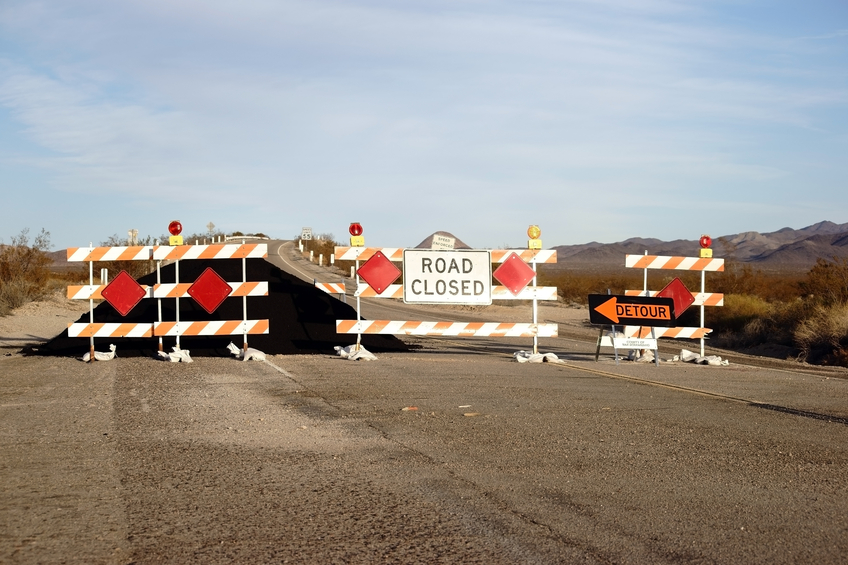Transportation and Florida Laws, Rules & Ethics 18 PDH Discount Package 3
Courses in this Package
Signal Timing Optimization (C05-005)
Synthesis of Variable Speed Limit Signs (C05-029)
Collaboration Across the Road Weather Enterprise (C06-021)
Engineering Laws, Rules and Ethics for Florida Professional Engineers (FL2-006)

This online engineering PDH course examines various cost-effective techniques that can be used to generate good signal timing plans that can be employed when there are insufficient financial resources to generate the plans using conventional techniques. This course develops a "tool box" of procedures and provides examples of how the tool box can be used when there is a moderate signal timing budget, when there is a modest signal timing budget, and when there is a minimum signal timing budget.
The conventional approach to signal timing optimization and field deployment requires current traffic flow data, experience with optimization models, familiarity with the signal controller hardware, and knowledge of field operations including signal timing fine-tuning. Developing new signal timing parameters for efficient traffic flow is a time-consuming and expensive undertaking.
This 5 PDH online course is applicable to traffic engineers and planners, administrators, managers, and technicians who are trying to maintain the best possible signal timing settings and adjustments to meet the ever-increasing traffic demands with less than optimal budgets.
This PE continuing education course is intended to provide you with the following specific knowledge and skills:
- Identifying system intersections
- Collecting and organizing existing data
- Conducting a site survey
- Obtaining turning movement data
- Calculating local timing parameters
- Identifying signal groupings
- Calculating coordination parameters
- Installing and evaluating new plans
In this professional engineering CEU course, you need to review the Federal Highway Administration Publication FHWA-HOP-07-006, "Signal Timing on a Shoestring".
Upon successful completion of the quiz, print your Certificate of Completion instantly. (Note: if you are paying by check or money order, you will be able to print it after we receive your payment.) For your convenience, we will also email it to you. Please note that you can log in to your account at any time to access and print your Certificate of Completion.

This online engineering PDH course provides a comprehensive review of current practice on Variable Speed Limit (VSL) operations, particularly experiences from deployments in the United States, and identifies successful and best practices from the following perspectives: planning and policy, design, deployment, standards, operations and maintenance, and outcomes.
Variable speed limit (VSL) systems utilize information on traffic speed, occupancy, volume detection, weather, and road surface conditions to determine the appropriate speeds at which drivers should be traveling, given current roadway and traffic conditions. The use of VSL during less than ideal conditions, such as heavy traffic and adverse weather conditions, can improve safety by decreasing the risks associated with traveling at speeds that are higher than appropriate for the conditions and by reducing speed variance among vehicles.
In addition, VSL can be used to dynamically manage speeds during planned (rush hour congestion) and unplanned (incidents) events. Used in conjunction with managed lanes and other active traffic management (ATM) strategies, VSL can respond to downstream congestion to eliminate or delay bottlenecks and mitigate the possibility of crashes.
This 5 PDH online course is mainly intended for transportation engineers who are interested in learning about current practices on VSL operations, particularly experiences from deployments in the United States.
This PE continuing education course is intended to provide you with the following specific knowledge and skills:
- Learning about variable speed limit systems used for congestion-based active traffic management, work zones, and weather
- Learning about the deactivated variable speed limit systems in the United States
- Understanding the methodology used by research teams in order to gather information on existing, deactivated and planned VSL systems
- Understanding the key considerations of the implementation of VSL systems including the VSL planning processes, design, deployment, standards and operations, and maintenance
- Exploring the benefits and challenges of variable speed limit systems
- Familiarizing with different agencies through interview summaries on the implementation of VSL systems
Upon successful completion of the quiz, print your Certificate of Completion instantly. (Note: if you are paying by check or money order, you will be able to print it after we receive your payment.) For your convenience, we will also email it to you. Please note that you can log in to your account at any time to access and print your Certificate of Completion.

This online engineering PDH course provides information on the best methods and practices for cross agency collaboration and the integration of weather information into daily transportation operations.
Weather has a significant impact on the operations of the nation’s roadway system year round. To help improve weather impacts on our roadways, the Federal Highway Administration (FHWA), Road Weather Management Program (RWMP), and the National Oceanic and Atmospheric Administration’s (NOAA’s) National Weather Service (NWS) have been working together to document the state-of-the-practice and working relationships between State Departments of Transportation (DOTs) and the weather enterprise.
The Pathfinder project was initiated to document current State DOT interactions and working relationships with the weather enterprise (both NWS and private sector). The team documented best practices across the agencies to disseminate consistent messages about the weather and its impact on the roads.
This 6 PDH online course is applicable to transportation engineers and traffic managers who are interested in learning more about the impact of weather on roadway systems and the best methods for improving the collaboration between State DOTs and the weather enterprise.
This PE continuing education course is intended to provide you with the following specific knowledge and skills:
- Familiarizing with the impact of weather on the nation’s roadway system
- Familiarizing with the Pathfinder project, its background and the related concepts
- Learning about applying road weather forecasting in a State
- Understanding the weather impact on safety, mobility and productivity
- Exploring collaborative partnerships and relationships between the State and weather enterprise
Upon successful completion of the quiz, print your Certificate of Completion instantly. (Note: if you are paying by check or money order, you will be able to print it after we receive your payment.) For your convenience, we will also email it to you. Please note that you can log in to your account at any time to access and print your Certificate of Completion.

Upon successful completion of the “Engineering Laws, Rules and Ethics for Florida Professional Engineers” course, we will report your PDH credits for this course to the FBPE within 2 business days. Therefore, it is imperative that you indicate your Florida PE license number in your CED account so that we can successfully do so. Once reported, please allow up to 48 hours for the FBPE to update their database.
This online PDH course is a FL approved Engineering Laws, Rules and Ethics course and is being offered by Continuing Education and Development, Inc, a FL approved Continuing Education Provider (CEP No. 0004183).
The first part of this course begins with an overview of the Laws and Rules governing the practice of engineering in the State of Florida (Chapter 1) including:
- Florida Statutes, Chapter 455, “Department of Business and Professional Regulation”
- Florida Statutes, Chapter 471, “Engineering”
- Florida Administrative Code, 61G15, F.A.C., “Florida Board of Professional Engineers”
Then it continues to address the rules amended, adopted or otherwise repealed from 61G15, F.A.C. (Chapter 2) as well as the changes to Chapters 455, F.S. and 471, F.S. (Chapter 3), within the preceding biennium, as applicable.
The second part of this course presents engineering ethics and the principles of professional responsibility (Chapter 4). It further illustrates the application of Chapters 455 and 471, F.S. to a randomly selected set of ethical and disciplinary cases (Chapter 5).
This 2 PDH online engineering course is applicable to Professional Engineers licensed in the State of Florida and who are required to demonstrate continuing professional competency in the Florida Laws, Rules and Ethics as a condition of license renewal. For each renewal period, every licensee must complete eighteen (18) professional development hours as follows:
- One hour must relate to this chapter and the rules adopted under this chapter;
- One hour must relate to professional ethics;
- Four hours must relate to the licensee’s area of practice; and
- The remaining hours may relate to any topic pertinent to the practice of engineering.
This PE continuing education engineering course is intended to provide you with the following specific knowledge and skills:
- Understanding the different Florida laws and rules regulating the practice of engineering in the State of Florida and their application to Professional Engineers
- Learning the rules adopted, amended or repealed from 61G15 within the preceding biennium
- Learning the changes made to Chapters 455, F.S. and 471, F.S. within the preceding biennium
- Understanding ethical behavior and the principles of professional responsibility in the field of engineering
- Understanding the general application of Chapters 455 and 471, F.S. to various ethical and disciplinary cases of Professional Engineers
Upon successful completion of the quiz, print your Certificate of Completion instantly. (Note: if you are paying by check or money order, you will be able to print it after we receive your payment.) For your convenience, we will also email it to you. Please note that you can log in to your account at any time to access and print your Certificate of Completion.